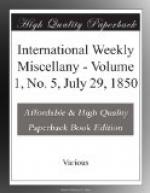I am by birth an Irishman, and descended from an ancient family. I lay no claim to any connection with Brian Boru, or Malichi, of the crown of gold, a gentleman who, notwithstanding the poetical authority of Tom Moore, we have some reason to believe during his long and illustrious reign was never master of a crown sterling. My ancestor was Colonel Hamilton, as stout a Cromwellian as ever led a squadron of Noll’s Ironsides to a charge. If my education was not of the first order, it was for no lack of instructors. My father, a half-pay dragoon, had me on the pig-skin before my legs were long enough to reach the saddle-skirt; the keeper, in proper time, taught me to shoot: a retired gentleman, olim, of the Welsh fusileers, with a single leg and sixty pounds per annum, paid quarterly by Greenwood and Cox, indoctrinated me in the mystery of tying a fly, and casting the same correctly. The curate—the least successful of the lot, poor man—did his best to communicate Greek and Latin, and my cousin Constance gave me my first lessons in the art of love. All were able professors in their way, but cousin Constance was infinitely the most agreeable.
I am by accident an only son. My mother, in two years after she had sworn obedience at the altar, presented her liege lord with a couple of pledges of connubial love, and the gender of both was masculine. Twelve years elapsed and no addition was made to the Hamiltons; when lo! upon a fine spring morning a little Benjamin was ushered into existence, and I was the God-send. My father never could be persuaded that there was a gentlemanly profession in the world but one, and that was the trade of arms. My brothers, as they grew up, entirely coincided with him in opinion, and both would be soldiers. William died sword in hand, crowning the great breach at Rodrigo; and Henry, after demolishing three or four cuirassiers of the Imperial Guards, found his last resting-place on “red Waterloo.” When they were named, my father’s eyes would kindle, and my mother’s be suffused with tears. He played a fictitious part, enacted the Roman, and would persuade you that he exulted in their deaths; but my mother played the true one, the woman’s.
It was an autumnal evening, just when you smell the first indication of winter in a rarefied atmosphere, and see it in the clear curling of the smoke, as its woolly flakes rise from the cottage chimney and gradually are lost in the clear blue sky. Although not a cold evening, a log fire was extremely welcome. My father, Heaven rest him! had a slight touch in the toe of what finished him afterward in the stomach, namely, gout.
“James,” said my lady mother, “it is time we came to some decision regarding what we have been talking of for the last twelve months. Frank will be eighteen next Wednesday.”
“Faith! it is time, my dear Mary; the premises are true, but the difficulty is to come at the conclusion.”
“You know, my love, that only for your pension and half-pay, from the tremendous depreciation in agricultural property since the peace, we should be obliged to lay down the old carriage, as you had to part with the harriers the year after Waterloo.”




